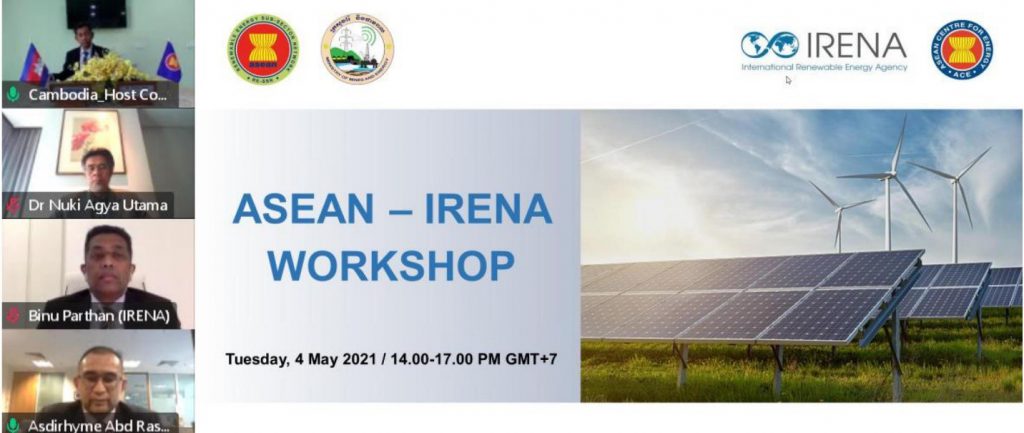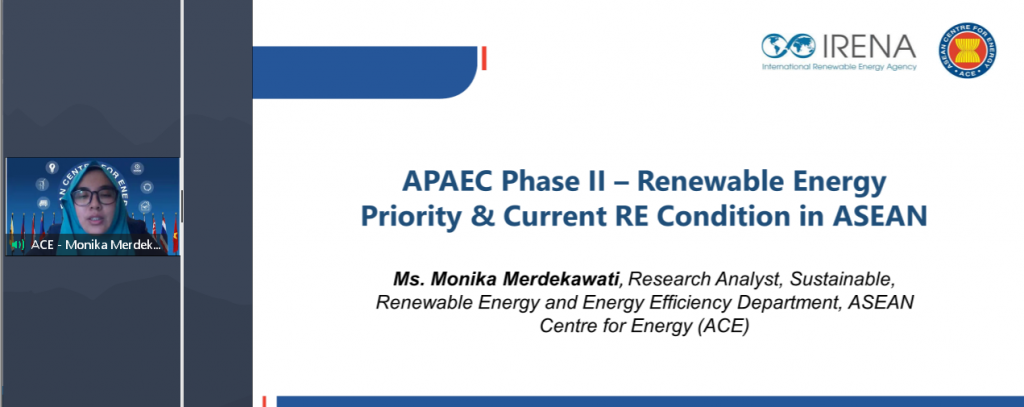Cambodia, 4 May 2021
In advancing cooperation between International Renewable Energy Agency (IRENA) and ASEAN and as part of Renewable Energy Sub-Sector Network (RE-SSN) Associated Meetings, ASEAN Centre for Energy (ACE) and IRENA held a joint workshop on 4 May 2021, hosted by Cambodia. The workshop aimed to align IRENA’s collaboration activities with plans of programme area no 5: renewable energy under ASEAN Plan of Action for Energy Cooperation (APAEC) Phase II 2021-2025. Opening remarks were delivered by H.E. Victor Jona, Director-General of Energy, Ministry of Mines and Energy and Senior Official on Energy Leader of Cambodia; Mr. Asdirhyme Abdul Rasib, Senior Undersecretary for Sustainable Energy, Ministry of Energy and Natural Resources Malaysia and Chair of RE-SSN; Mr. Binu Parthan, IRENA Head of Regions; and Dr. Nuki Agya Utama, Executive Director of ACE. Research analyst of ASEAN Climate Change and Energy Project (ACCEPT), Ms. Monika Merdekawati, was invited as a speaker and pointed out about Renewable Energy priority in APAEC Phase II and current condition in ASEAN.

(Photo caption: Opening remarks by Honorable, H. E. Victor Jona; Dr. Nuki Agya Utama; Mr. Binu Parthan; and Mr. Asdirhyme Abdul Rasib)
ASEAN-IRENA accomplishments and priorities were displayed by Ms. Badariah Yosiana from IRENA. To strengthen dialogue between ASEAN and IRENA, Memorandum of Understanding (MoU) was signed in 2018. Since then, IRENA has supported the region in renewables and energy transition agenda. In 2021 – 2022, IRENA priorities are the support and engagement of National Determined Contributions (NDCs) in ASEAN.
Presenting the World Energy Transition Outlook (WETO), Mr. Nicholas Wagner from IRENA emphasized the importance to achieve the 1.5 °C global scenario with net zero emission through improvement of Renewable Energy (RE), Energy Efficiency (EE), and electrification. The share of renewable energy in primary supply will need to grow from 14% in 2018 to 74% in 2050. Renewables need to supply 90% of total electricity by 2050, up from 25% in 2018. Investment in renewables, efficiency and electrification need to be scaled up. For the 1.5 °C scenario, requiring around USD 4.4 trillion per year of investment. Integrated innovation for energy transition process should be accompanied with holistic transformation through finance innovation, business models and community engagement, structural changes across value chain, governance and institutional framework, market design and regulation, and technology and infrastructure.
To enhance power system flexibility in the region, Mr. Raul Miranda described the IRENA Flextool which is an optimisation tool that solves economic dispatch and capacity expansion. IRENA FlexTool is used for flexibility assessment for national power sector plans, flexibility assessment for RE map electricity scenarios, and analysis of flexibility options to integrate Photovoltaics (PV) and wind. IRENA FlexTool promotes countries individual capabilities and evaluates potential synergies to support increasing shares of RE in the region.
RE has a huge potential to be implemented globally. In 2005 there were only 43 countries who had announced RE targets, which as of the end of 2019 increased significantly to 172 countries. Energy transition is essential for heating and cooling too. The five transition pathways in heating and cooling are renewables-based electrification, renewable gases, sustainable biomass, solar thermal heat, and geothermal heat. Also, the development of green hydrogen; policies for access to clean, affordable, and reliable energy; electrification; and power systems are crucial for energy transition, pointed out by Ms. Diala Hawila from IRENA.
From ASEAN socio-economic perspective, implementation of Transforming Energy Scenario (TES) which highlights the improvement of renewables will increase global Gross Domestic Product (GDP) rate, job creation and welfare significantly compared with the Planned Energy Scenario (PES), explained by Mr. Bishal Parajuli from IRENA. Compared to PES, GDP of Southeast Asia improves at an average rate of 3.2% until 2050, jobs in renewables almost doubled, and welfare improves by 11.2% in 2050 primarily due to improvement in health and GHG emission reduction. The on-going Climate Investment Platform (CIP) will enhance RE investing with projected total installed capacity 464 MW, capital mobilization USD 1.1 billion and GHG emission reduced 5 tCO2e million, brought by Mr. Tarig Ahmed from IRENA.

(Photo caption: APAEC Phase II by Ms. Monika Merdekawati)
For the last session, the RE Programme Area priorities under APAEC Phase II were delivered by research analyst of ACCEPT, Ms. Monika Merdekawati. Supporting RE program area of APAEC, there are 6 outcome-based strategies and 16 action plans. Of which, ACCEPT has continuously support through various thematic studies on RE, including the analysis of covid-19 impact on energy sector, or known as covid-19 insight series.
Taking the key findings from covid-19 insight series, the falling electricity demand caused immense profit loss in most of ASEAN Member States (AMS) utilities, forcing the utilities to readjust their investment portfolio. Due to continuous financial loss, it is natural to see a negative impact in renewable development, although in the year 2020, the condition gets better. Further, the movement restriction has caused a major supply chain disruption, affecting the RE projects in ASEAN where it is pretty much depended on imported machine and technologies and foreign experts. However, despite multiplier effects of Covid-19 pandemic, the pandemic has
Based on ACE survey result, fossil fuel (coal, oil, and gas) is the most impacted energy sector from Covid-19 pandemic by 68%, while RE only 16%. Oil & gas companies are rethinking their investment to be more into clean energy technologies. To leverage the untapped RE, ASEAN could capture the potential financing flow from the latest divestment strategy from oil companies, both global and regional.
Hence, ACCEPT as a project aiming to improve the coherence between the ASEAN energy and climate policies plays a significant role to accelerate energy transition under APAEC Phase II, to achieve the 1.5 °C scenario with net zero emission.
SNF